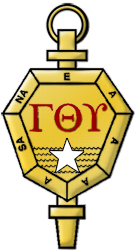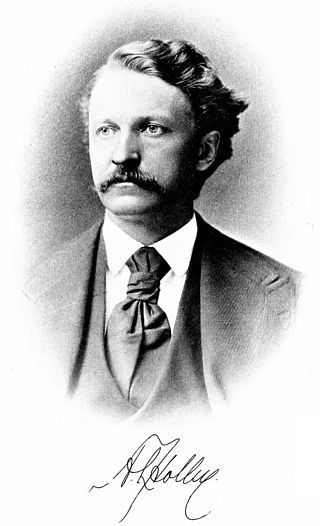The Association for Computing Machinery (ACM) is a US-based international learned society for computing. It was founded in 1947 and is the world's largest scientific and educational computing society. The ACM is a non-profit professional membership group, reporting nearly 110,000 student and professional members as of 2022. Its headquarters are in New York City.

Samuel Eliot Morison was an American historian noted for his works of maritime history and American history that were both authoritative and popular. He received his Ph.D. from Harvard University in 1912, and taught history at the university for 40 years. He won Pulitzer Prizes for Admiral of the Ocean Sea (1942), a biography of Christopher Columbus, and John Paul Jones: A Sailor's Biography (1959). In 1942, he was commissioned to write a history of United States naval operations in World War II, which was published in 15 volumes between 1947 and 1962. Morison wrote the popular Oxford History of the American People (1965), and co-authored the classic textbook The Growth of the American Republic (1930) with Henry Steele Commager.

John Brewster Hattendorf, FRHistS, FSNR, is an American naval historian. He is the author, co-author, editor, or co-editor of more than fifty books, mainly on British and American maritime history and naval warfare. In 2005, the U.S. Naval Institute Proceedings described him as "one of the most widely known and well-respected naval historians in the world." In reference to his work on the history of naval strategy, an academic in Britain termed him the "doyen of US naval educators." A Dutch scholar went further to say that Hattendorf "may rightly be called one of the most influential maritime historians in the world." From 1984 to 2016, he was the Ernest J. King Professor of Maritime History at the United States Naval War College in Newport, Rhode Island. He has called maritime history "a subject that touches on both the greatest moments of the human spirit as well as on the worst, including war." In 2011, the Naval War College announced the establishment of the Hattendorf Prize for Distinguished Original Research in Maritime History, named for him. The 2014 Oxford Naval Conference - "Strategy and the Sea" - celebrated his distinguished career on April 10–12, 2014. The proceedings of the conference were published as a festschrift. In March 2016, Hattendorf received the higher doctorate of Doctor of Letters (D.Litt.) from the University of Oxford. Among the few Americans to have received such designation, Hattendorf remained actively engaged on the Naval War College campus after his formal retirement in 2016.

Gamma Theta Upsilon is an international honor society in geography. It was established in 1928 as a professional fraternity at Illinois State University and became international in 1969. Gamma Theta Upsilon is a member of Association of College Honor Societies.

Alexander Lyman Holley was an American mechanical engineer, inventor, and founding member of the American Society of Mechanical Engineers (ASME). He was considered the foremost steel and plant engineer and designer of his time, especially in regard to applying research to modern steel manufacturing processes.
The Society for Historians of American Foreign Relations (SHAFR) was founded in order to "promote excellence in research and teaching of American foreign relations history and to facilitate professional collaboration among scholars and students in this field around the world." It hosts an annual conference, and publishes the quarterly Diplomatic History. It also publishes a triennial newsletter, Passport. SHAFR has increasingly fostered connections with international historians and organizations.

The World Maritime University(WMU), in Malmö, Sweden, is a postgraduate maritime university founded within the framework of the International Maritime Organization (IMO) - a specialized agency of the United Nations. Established by an IMO Assembly Resolution in 1983, the aim of WMU is to further enhance the objectives and goals of IMO and IMO member States around the world through education, research, and capacity building.

The Psychonomic Society is an international scientific society of over 4,500 scientists in the field of experimental psychology. The mission of the Psychonomic Society is to foster the science of cognition through the advancement and communication of basic research in experimental psychology and allied sciences. It is open to international researchers, and almost 40% of members are based outside of North America. Although open to all areas of experimental and cognitive psychology, its members typically study areas such as learning, memory, attention, motivation, perception, categorization, decision making, and psycholinguistics. Its name is taken from the word psychonomics, meaning "the science of the laws of the mind".

James Preston Delgado is a maritime archaeologist, historian, maritime preservation expert, author, television host, and explorer.

Dr. Clark Gilbert Reynolds, B.A., M.A. (History), Ph.D. was a historian of naval warfare, with a particular interest in the development of U.S. naval aviation. In addition, he made contributions to the fields of world history, strategic history, and the history of maritime civilizations.

The Naval Historical Foundation was a nonprofit organization founded in 1926 and disbanded in 2022. It had a broad mission to preserve and promote the naval history of the United States by supporting official maritime history programs and institutions, meeting the needs of the public for naval history, and collecting historical items. The foundation was located at the Washington Navy Yard in Washington, D.C.
The John Lyman Book Awards are given annually by the North American Society for Oceanic History to recognise excellence in published books making a major contribution to the study and understanding of maritime and naval history. They are named after Professor John Lyman (1915–1977) of the University of North Carolina.
James Chapin Bradford is an American professor of history at Texas A&M University and a specialist in American maritime, naval, and military history in the early national period of American History.
William Norwood Still Jr. was an American maritime historian. He was the first director of the program in maritime history at East Carolina University and a noted author of works on U.S. Civil War history and U.S. naval history.
Karl Jack Bauer, was one of the founders of the North American Society for Oceanic History (NASOH) and a well-known naval historian. NASOH's K. Jack Bauer Award is named in his memory.
Founded in 1981, the American Journalism Historians Association (AJHA) seeks to advance education and research in mass communication history. Through its annual meeting, regional conferences, committees, awards, speakers and publications, members work to raise historical standards and ensure that all scholars and students recognize the vast importance of media history and apply this knowledge to the advancement of society.
Lawrence E. Babits is an American archaeologist with specific interests in military history, material culture, and battlefield and maritime archaeology. Babits is credited with highly accurate accounts of soldiers' combat experience during the 18th century, specifically during the Battle of Cowpens, a turning point in the American Revolutionary War. This is illustrated in his books Long, Obstinate and Bloody: The Battle of Guilford Courthouse and A Devil of a Whipping: The Battle of Cowpens. Babits was a George Washington Distinguished Professor of Maritime Archaeology and History at East Carolina University.
Barry Morton Gough is a global maritime and naval historian.
Philip Karl Lundeberg was an American naval historian and curator emeritus of the Smithsonian Institutions National Museum of American History. At the time of his death in 2019, Lundeberg was the last survivor of the USS Frederick C. Davis sinking.
Spencer C. Tucker is an American historian who was a Fulbright scholar, retired university professor, and author of works on military history. He taught history at Texas Christian University for 30 years and held the John Biggs Chair of Military History at the Virginia Military Institute for six years.








